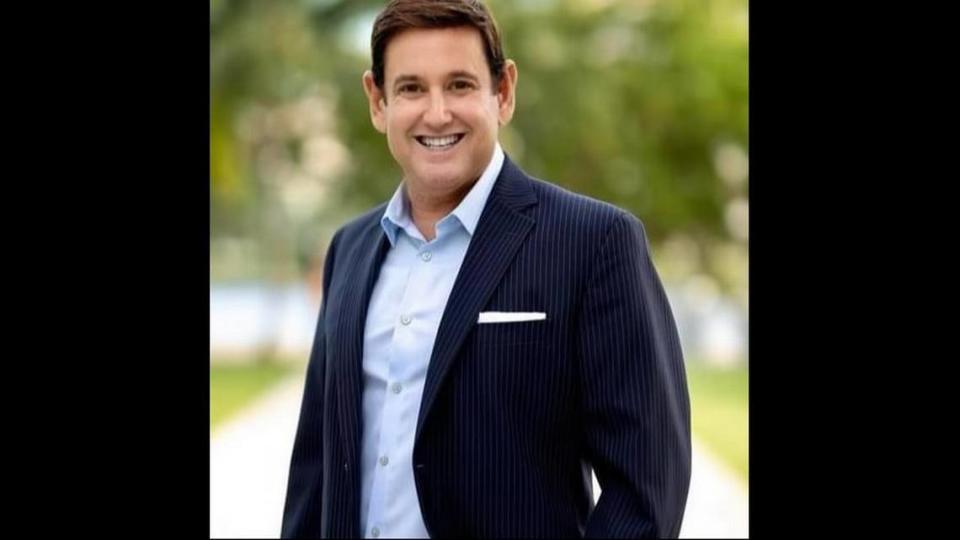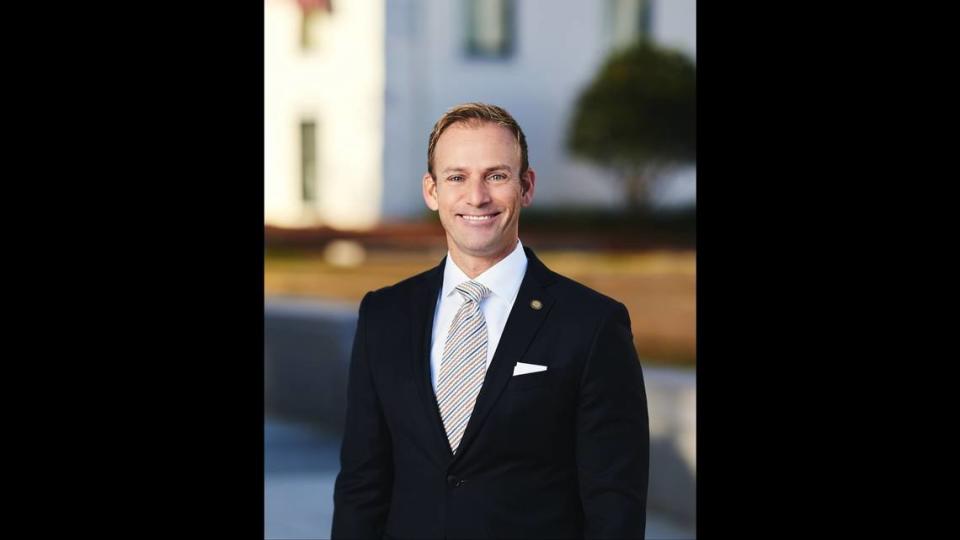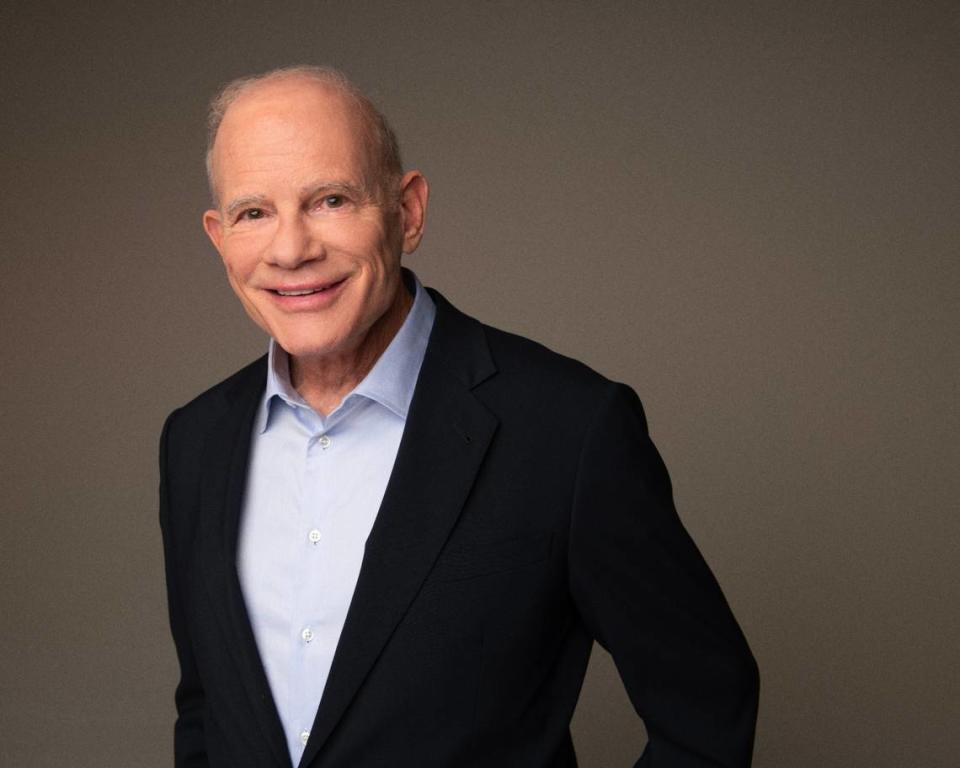Miami Beach will elect a new mayor. What you should know about the four candidates
Miami Beach voters have begun casting mail ballots for the city’s first new mayor in six years, as Dan Gelber’s time in office wraps up due to term limits.
Four candidates are vying to succeed Gelber and chart a path forward for the tourist hub, where spring break, crime, traffic, development and sea-level rise are top priorities for residents.
Election Day is Nov. 7. If no candidate receives more than 50% of votes, there will be a runoff Nov. 21.
Early voting runs from Oct. 23 to Nov. 5. The last day to request a mail ballot is Oct. 26. Voters began receiving mail ballots last week.
Here is what you should know about the mayoral candidates: Michael Gongora, Mike Grieco, Steven Meiner and Bill Roedy.
Michael Gongora

Background
Gongora, 53, is a condo board attorney who served three terms on the Miami Beach City Commission. He was first elected in a special election in 2006, serving a partial term, and was elected again in 2009 and 2017.
In 2021, Gongora sued the city to challenge a voter referendum that limits a commissioner’s time in office to two complete terms, but a judge ruled against him. Shortly afterward, Gongora filed to run for mayor.
This is his second mayoral run. The first was in 2013, when he placed second to former Mayor Philip Levine. If Gongora wins, he would become the first openly gay mayor of Miami Beach.
On the issues
Gongora has touted his city commission experience to say he’s the best option to tackle public safety, quality of life and infrastructure issues.
He has previously supported the hiring of more police officers, and says he would eliminate the “anything goes” atmosphere in the city. But he says a move from 5 a.m. to 2 a.m. last call for alcohol on Ocean Drive and other nightlife hot spots isn’t the answer, saying the change makes more sense in residential neighborhoods.
On development, Gongora says he supports “responsible” projects but not those that are out of scale with neighborhoods and require changes to existing zoning.
Campaign finance
Gongora has reported nearly $365,000 in contributions to his campaign, including $55,000 in loans from his own money. He is also affiliated with three political committees that have brought in about $378,000.
Among the big donations:
$50,000 from Location Ventures, the real estate firm previously run by developer Rishi Kapoor, whose payments to Miami Mayor Francis Suarez have come under scrutiny.
$10,000 from Sandor Scher, a developer whose projects include an overhaul of Ocean Terrace in the North Beach neighborhood.
$7,000 from entities tied to David Wallack, the owner of Mango’s Tropical Cafe on Ocean Drive and a major opponent of Gelber’s push for a 2 a.m. last call for alcohol.
Other notes
Gongora is a close ally of Commissioner Kristen Rosen Gonzalez, who has been Gelber’s biggest critic and is often at the center of controversy in Miami Beach politics. Rosen Gonzalez and the two other commissioners who will remain in office after the upcoming election, Alex Fernandez and Laura Dominguez, have endorsed Gongora.
His relationship with Rosen Gonzalez has raised questions along the campaign trail. Earlier this year, Grieco released audio he secretly captured of Gongora saying he and Rosen Gonzalez had met with developer Russell Galbut, and that Galbut was “already with me and giving me money.” Grieco said the comments raised campaign finance concerns because Galbut is on a list of developers prohibited from giving to candidates. Gongora noted that Galbut has family members in Miami Beach who can support him.
Mike Grieco

Background
Grieco, 48, is a criminal defense attorney who previously served as a Miami Beach city commissioner and a state representative. He began his legal career as a prosecutor in the Miami-Dade State Attorney’s Office, where he was the felony division chief.
His 2017 campaign for mayor was derailed after it was revealed he had accepted an illegal contribution from a foreign donor to a PAC that he claimed he knew nothing about. Grieco resigned from the city commission at the time and pleaded no contest to a misdemeanor charge.
He returned to politics, getting elected as a Democratic state representative in 2018. He served in that role until last year.
On the issues
Grieco has billed himself as the best candidate to navigate the political landscape between Miami Beach and Tallahassee, where the state has sought to reduce the authority of local governments in recent years.
He also says he would push for new measures during spring break, including suspending access to public parking except for residents and employees, implementing security checkpoints, and beefing up police at city entry points.
Grieco has said he supports 2 a.m. alcohol curfews for new businesses in residential neighborhoods, but doesn’t support any moves that would force existing businesses to close.
Campaign finance
Grieco has reported more than $319,000 in contributions to his campaign, $75,000 of which comes from his own money. He is also the chair of a political committee, Strong Leadership for South Florida, that has brought in more than $265,000 since Grieco filed to run for mayor on Feb. 1.
Among the big donations:
$40,000 from Suntex Marina Investors, which operates the Miami Beach Marina. Suntex hired Grieco as a lobbyist last year during discussions about resident complaints of noise and debauchery from commercial charter boats operating out of the marina.
$21,000 from Steve Patterson, president and CEO of Related Development, the rental development division of real estate giant Related Group.
$10,000 from entities tied to ArcPe, a private equity firm based in Miami Beach.
Other notes
In August, Grieco left a bag with a loaded handgun inside unattended at an open-air dog park in South Beach. He says he put the bag down and then “somebody grabbed it before I realized it.” Grieco told the Herald last month that the incident “shouldn’t have happened.”
Meanwhile, there is still fallout from Grieco’s 2017 mayoral campaign. A judge has recommended a 90-day suspension of Grieco’s law license as part of an ongoing Florida Bar case in connection with statements he made about the secretive PAC. The Florida Supreme Court will have the final say.
Steven Meiner

Background
Meiner, 52, is an enforcement attorney with the U.S. Securities and Exchange Commission. Before moving to Miami Beach in 2007, Meiner was a private practice litigator in Manhattan.
He was elected to the Miami Beach City Commission in 2019, securing a spot in a recount by a two-vote margin before defeating Rosen Gonzalez in a runoff election for her old commission seat. He won the runoff despite being outspent by about $150,000.
On the issues
Meiner has billed himself as the “law and order candidate” for mayor. As a commissioner, he has emphasized tougher police responses to crime, pushing for expansion of a municipal prosecutor program and a controversial law that led to arrests of people for filming police officers.
Meiner has also raised concerns about discussions of bail reform in Miami-Dade County and supported a measure that would subject homeless people to arrest for sleeping outside if they refuse a shelter bed. He has supported a 2 a.m. last call for liquor sales.
In response to a new Tallahassee law that bans local referendums on most development matters, Meiner has proposed a six-vote requirement — rather than the current five out of seven votes needed — for the city commission to approve building larger structures than currently allowed.
Campaign finance
Meiner has reported over $68,000 in contributions since entering the race in June.
He is the lone mayoral candidate who has not used a political committee to take in contributions above the $1,000 limit for donations to campaigns. He says he is not accepting contributions from developers.
Meiner has touted his political independence as an asset on the commission, saying he isn’t swayed by outside pressure. When the commission voted to pursue a potential no-bid deal with Boucher Brothers for the Nikki Beach property earlier this year, Meiner was one of two “no” votes.
Other notes
Meiner has faced criticism from opponents and some fellow commissioners for voting against resolutions on a range of social matters, including LGBTQ issues like support for gender-affirming care and renaming a street after the late California politician Harvey Milk.
Meiner has repeatedly said he has a blanket policy against supporting items that don’t directly relate to Miami Beach legislation or regulation, arguing they take time away from more pressing commission business.
Bill Roedy

Background
Roedy, 75, is the former CEO of MTV Networks International. This is his first run for political office. He attended the United States Military Academy at West Point, then served a year in Vietnam during the Vietnam War and commanded NATO nuclear missile units in Italy during the Cold War.
He went on to work at MTV, leading its international operations and launching the headquarters of MTV Latin America in Miami Beach. He also played a prominent role in humanitarian efforts against HIV and AIDS, being named an ambassador for the United Nations’ anti-AIDS program in 1998.
On the issues
Roedy has argued his political outsider status makes him best positioned to disrupt business as usual in Miami Beach. He has spoken about the need to protect and improve the city’s image and “priceless global brand.”
Roedy has called for increasing police resources by at least 10%, creating a “real-time traffic center” to analyze traffic patterns, and getting rid of a “pay to play” culture that lets developers and lobbyists influence decisions.
Roedy says he opposes the 2 a.m. last call except during spring break and other high-impact weekends because there is limited evidence that it would be effective.
Campaign finance
Roedy has loaned more than $2 million to his campaign, which has paid for a TV ad during the NBA finals, billboards over the Julia Tuttle Causeway and a blitz of other ads and events to introduce voters to his entry into Miami Beach politics. The campaign has reported nearly $1.8 million in spending.
Roedy’s campaign has raised an additional $18,000 from donors. He is also raising money for a political committee, Miami Beach Leadership in Action, that has reported nearly $84,000 in contributions.
Other notes
Roedy has taken a more aggressive approach to campaigning as Election Day draws near, releasing a barrage of attack ads against Grieco.
He has pushed back against questions about his residency. Roedy grew up in Miami Shores and North Miami before leaving for West Point. His campaign website says he and his wife are “long-time residents of Miami Beach since 1999.” That’s when the couple bought an oceanfront condo on Ocean Drive.
But opponents have questioned his residency. In a 2021 podcast interview, Roedy said he has British citizenship and had lived in London for 31 years. He told the Miami Herald he generally spent “at least four months of the year” in Miami Beach after he moved to London as he oversaw the MTV Networks Latin America headquarters on Lincoln Road.

